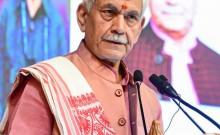
Pakistani Prime Minister Nawaz Sharif has once again apparently affronted India by calling known terrorist Burhan Wani a "vibrant and charismatic leader." The statement goes against the many others by the PML-N chief about how Pakistan is a victim of terrorism, and has fought hard to get rid of it from its soil, and that the country is against terrorists and terrorism.
India has for quite some time been isolating Pakistan at various international levels on terrorism, and this statement by Sharif will give it further ammunition to continue its efforts. It will also give India more scope to bring up the Balochistan issue, on which Prime Minister Narendra Modi has already spoken, much to Pakistan's consternation.
Burhan Wani, a top leader of the proscribed terror group, Hizbul Mujahideen, was killed in an encounter with the Indian Army last year. Since then, Kashmir has seen a lot of protests and unrest, with the Valley being shut down for months on end. Pakistan even marked a Black Day to mark Wani's killing, hailing him as a martyr.
It is this terrorist that Sharif was praising at the International Parliamentary Seminar on Kashmir in Islamabad recently, according to a Dawn report. He said at the event: "Seventy years of brutal repression and Kashmiri struggle in the face of that oppression have shown cries of freedom cannot be stifled by sounds of bullets."
Perhaps Sharif was talking about what is now Pakistan-occupied Kashmir (PoK), where people have been protesting over rigged elections, and have been brutally treated for it. As for the "sounds of bullets," they could have very well come from the rifles of Pakistan Rangers, who have been facing protests in Gilgit-Baltistan after detaining an activist.
Sharif also said the "martyrdom" of "vibrant and charismatic leader" Burhan Wani had "become a rallying point for the freedom loving people of the territory." He added that India's effort "to silence that one voice have unleashed a thousand more," referring to the Kashmir unrest.
It may be noted here that most of the unrest had died down almost immediately after Modi had announced demonetisation, leading to the conclusion that terror funding had been hit hard by the move. It also meant that the unrest in Kashmir had been politically motivated, and with legal tender no more in the hands of terrorists or their backers, there was nothing to pay the proxy-protesters.

















